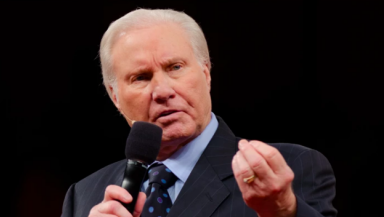
The greatest preacher in modern history died a few days ago - at least according to one Australian pastor who wrote effusively, “In my opinion, he was the greatest preacher in modern history. And he was always very kind to me personally. I have watched hundreds of his messages. He has inspired me to be truly Pentecostal. I will miss him. He was such an inspiration to me.”
He was speaking of Jimmy Swaggart, one of the best-known televangelists – and not just because he was a cousin of Jerry Lee Lewis. In the mid-1980s, Jimmy Swaggart Worldwide Ministries had a television presence in more than 140 countries and took in up to half a million dollars a day from donations and sales of Bible courses, gospel music and merchandise.
He was widely considered to be one of the great speakers of the age – in any format. ‘Hypnotic’ was the description of one secular journalist.
But all was not well. In February 1988, in an extraordinary piece of television, Swaggart made his public confession in front of some 7,000 followers at his World Faith Centre in Baton Rouge. He confessed to his wife and then went on to weepingly confess: “I have sinned against you, my Lord, and I would ask that your precious blood would wash and cleanse every stain.”
There are those who argue that this is the same as King David confessing after being confronted by the prophet Nathan and then writing Psalm 51. One is always reluctant to speak ill of the dead, but in this instance such hyperbole is not only nonsensical but dangerous. Mr Swaggart stands as an example to us, not of a repentant sinner returning to the Lord, but of the dangers that money, fame and power bring to any Christian ministry.
The trouble is that the story is far worse than the simplistic narrative I have provided above. Just months before he himself was caught, Swaggart had denounced Jim Bakker, another Assemblies of God minister and leader of the PTL television ministry, as “a cancer that needed to be excised from the body of Christ”. Mr Bakker had also committed sexual indiscretion.
Then Mr Swaggart accused another Assemblies evangelist, Marvin Gorman of New Orleans, of being a serial adulterer. Gorman admitted one immoral act with a woman but denied the other accusations and was awarded $10 million in damages. He got his revenge through hiring a private detective, who followed Mr Swaggart and took the compromising photographs which resulted in the tearful public confession.
Swaggart was then suspended from preaching for a year by the Assemblies of God. It was hardly a great punishment, but nonetheless it was one he refused to obey. He took to the pulpit again after three months and was then defrocked. Why did he do this? No doubt because to have stayed silent for one year would have ruined his TV ministry, and that would have meant no donations coming in.
Three years later Swaggart was pulled over by police in California with a prostitute in his car. She testified that he had become alarmed when he saw a police vehicle behind him. In trying to hide pornographic magazines under his seat, he swerved and this caused the police to stop him.
Rather than a tearful repentance this time, he told his congregation in Baton Rouge, “The Lord told me it’s flat none of your business.” His son later said he would be seeking spiritual and medical help.
Later on in life Swaggart never specifically confessed to his earlier sins, nor repented of his disobedience to his denomination. While some supporters argue that his continued work in preaching the Gospel was evidence enough of repentance, others point out that the continued work could just as easily be seen as a means of financial enrichment. He had a sprawling house in Baton Rouge, a private jet and ‘his and hers’ luxury cars for himself and his wife. Clearly he saw ‘godliness as a means to financial gain’ (see 1 Timothy 6:5-10).
The absence of any later confession or specific repentance is significant, as true repentance (see 2 Corinthians 7:10-11) involves acknowledging specific wrongs, seeking forgiveness, and demonstrating changed behaviour.
I remember speaking with a man who when in ministry had committed a far lesser sin than Swaggart’s. When I asked him what he felt about returning to public ministry in the church, he said he never would. He felt that though he had been forgiven and was at peace, yet he had destroyed his ministry, and people would never know whether they could really trust him or not. He was right - and wise.
Jimmy Swaggart is an example, but not of a godly preacher who fell, confessed and was restored. Instead, he will go down in history as an example of a Christianity which lost its way and became immersed in the unholy trinity of money, sex and power. Swaggart was good at denouncing everyone from Catholics to Calvinists, as sending people to Hell. Sadly, it is the hypocrisy of those who preach the Gospel, but do not live it, who do far more to pave the road to Hell.
Rather than celebrate Jimmy Swaggart, we should mourn that the name of God was undoubtedly blasphemed because of him (Romans 2:24). And those of us who are preachers should take special care lest we also fall (1 Corinthians 10:12). The Church in the West has already had enough scandals this century. We don’t need any more. Repentance, humility and a return to the methodology, theology and ecclesiology of the Bible may help us in that goal.













